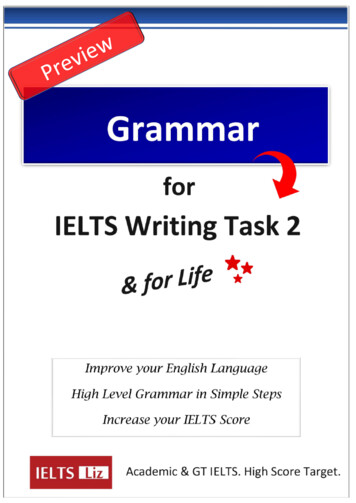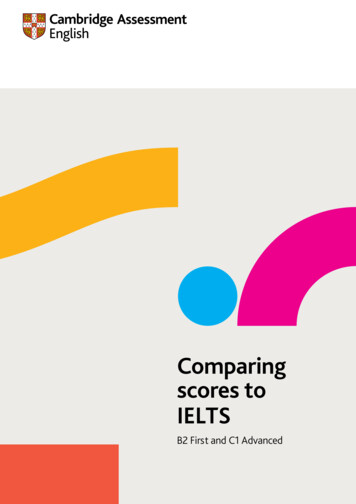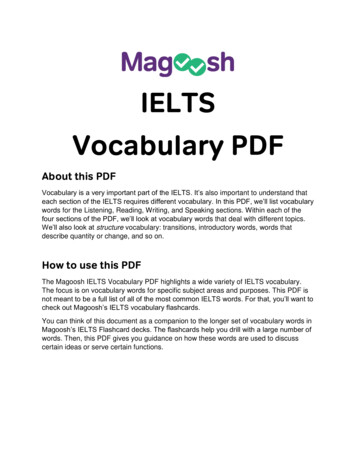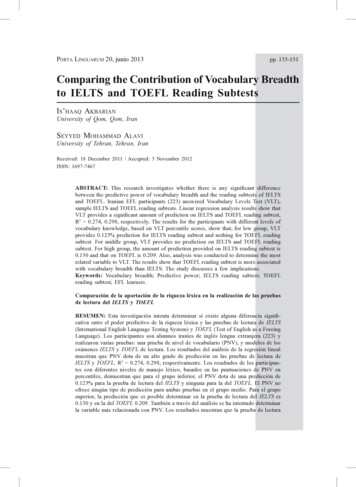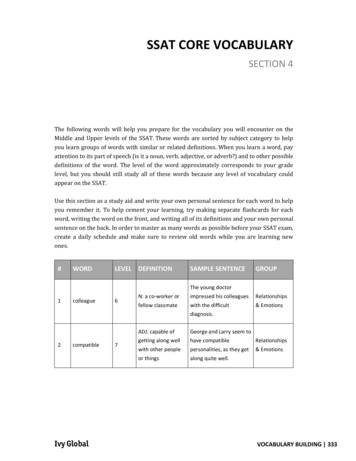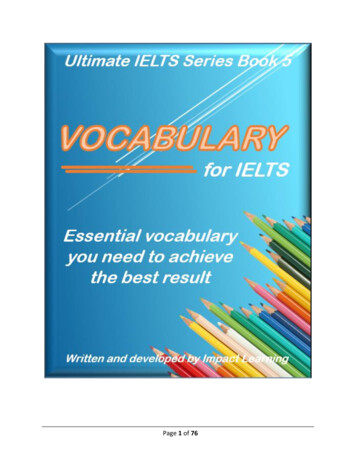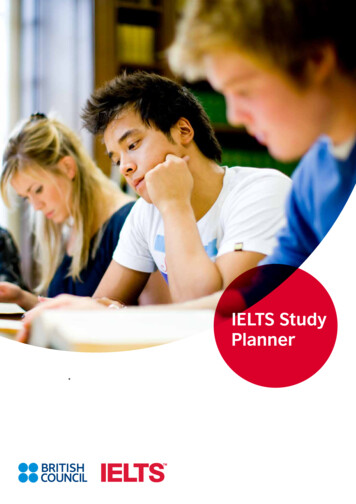
Transcription
Your 28-Day IELTSVocabulary challengeJust 28 Days to level up your IELTS scoreby Fiona Wattam
IELTS 28-Day Vocabulary challengeA very warm welcome to the IELTS 28-DayVocabulary ChallengeDay 1: Agriculture/Farming Ѩϼ̾All I would like you to do today is to get your notebook system started.Write down all of today's words with their meanings and/or translations.Don't panic about how much there is to do in Lesson 1 - these are just options to suit yourpersonal needs, as everyone is taking the course for a di erent reason.Watch the video to introduce the vocabulary in context, or to recycle and review the vocabularythat you've learnt.Think about the positives and negatives of each topic. IELTS wants you to analyse and questioneverything, to show your understanding.So here, for example, in note form:Intensive farming - good or bad?Good - more productive, higher crop yields, feeding a growing population Bad - loss of biodiversity, heavy use of pesticides Learning Link: An app like Flipboard helps you keep IELTS-related articles in one place. You canfollow my board here, and never be stuck for something to read.IELTS Exam Training Courses
IELTS 28-Day Vocabulary challengeDay 2: Nature ЛToday we're thinking about using a good learner dictionary and how it can help you.To understand and use a word well, you need to know:- the meaning- the spelling- the pronunciation- the form- the register/style- the words it goes with- synonyms/antonyms- how to use it in a sentenceIt's di cult to do ALL of these for every single word, but a good learner dictionary does the workfor you. So you need to fall in love with your dictionary because it will be a long-lasting rewardingrelationship! Learning Link: Check out Longman Online Dictionary - if you follow this link, you’ll nd I’ve putthe word ‘pollution’ in and it gives you some great collocations that you can use in the test e.g.‘tough anti-pollution laws’.IELTS Exam Training Courses
IELTS 28-Day Vocabulary challengeDay 3: Wildlife/Animals ƋIn Day 3 you'll start to see the same topics being reviewed. It's almost impossible to separateanimals, wildlife, farming etc as they are all linked in their own 'ecosystem', so this is a good wayto review and recycle the vocabulary related to the whole topic of the environment.Your mission for today: focus on pronunciation.Let's look at yesterday's words again and focus on how to pronounce them accurately.pollutant /pəˈlu:tənt/ n [C]pollute /pəˈlu:t/ v [T]polluted /pəˈlu:tɪd/ adjpolluter /pəˈlu:tə əʳ/ n [C]pollution /pəˈlu:ʃᵊn/ n [U]Put them in sentences that you would actually use in the Speaking test:e.g. What are the drawbacks of living in the city?''The air in the city is heavily polluted''Air pollution is a growing cause for concern'Learning Link: Youglish (in this link I’ve put in the word ‘pollution’ again!)My YouTube video might help you get started with the phonemic alphabet. It focuses only onuseful words for IELTS.IELTS Exam Training Courses
IELTS 28-Day Vocabulary challengeDay 4: Pollution ۢϭ ڙ ЋIn Day 4 you'll learn words related to threats to wildlife/the environment and possible solutions.Your mission for today: focus on spelling.This includes learning patterns and reviewing word formation.Make sure that your write other forms of the words in your list, to help you develop andrecognise key spelling patterns, such as words which end in '-ion' (IELTS gap- lls love to test thisword-ending!).e.g. pollute /pəˈlu:t/ v [T] pollution /pəˈlu:ʃᵊn/ n [U](contaminate - contamination, deplete - depletion, emit - emission)Download this word-formation worksheet from my website if you'd like to do more work on thisand to see how using noun forms can increase your score in the Writing Test.Learning Link: TheFreeDictionary.com now allows you to create your own personal homepageby adding and removing, dragging and dropping, and "using or losing" existing contentwindows. In addition, you can add your own bookmarks, weather information, horoscope, andRSS feeds from anywhere on the web.You might also want to have a go with this funny little old-fashioned looking Academic Word ListQuizzes site!IELTS Exam Training Courses
IELTS 28-Day Vocabulary challengeDay 5: Recycling It's FRIYAY ٌϽ!In Day 5 you'll learn words related to recycling and the problem of how to dispose of waste.Your mission for today: RECYCLE your vocabulary!Go back and look over the last 5 days and see how much you can remember about theMEANINGS of the all the words you've covered at this stage.Reviewing and recycling daily will help the words stick.'reviewing' looking over the words again'recycling' looking at the same words in di erent contexts.So if you've already checked the meanings, try a Reading or a Listening to help you see/hear thewords in di erent contexts.Learning Link - have a quick look at SKELL (Sketch Engine for Language Learning) and save it toyour favourites. It's useful for nding words in context and looking at how they work in samplesentences.IELTS Exam Training Courses
IELTS 28-Day Vocabulary challengeDay 6: Water I've kept Day 6 for the weekend (if you started on Monday!) because it's such a huge topic inIELTS.Your mission for today: focus on collocation (words that go together)Water is a 'precious resource'.'Water supply systems' are 'under growing strain'.We need to 'reduce consumption' and 'conserve supplies'.To 'tackle the situation' we need to 'prevent leaks' 'impose water charges' and 'charge realisticprices'All of the examples above are collocations related to water. If you learn them as 'chunks', theywill be easier to reproduce in the test.Link of the day - check out this nice list of 50 academic collocations.Video review of keyvocabularyIELTS Exam Training Courses
IELTS 28-Day Vocabulary challengeDay 7: Travel and Tourism ڀ You made it to the end of Week 1 - well done.Your mission for today: focus on reviewing Week 1This is the day to go back through all of the words relating to the topic of The Environment.Test yourself. Get someone to test you.- Do you know the meanings and the main forms?- Can you pronounce them?- Can you spell them?- Can you use them in a sentence?Link of the day - Have you ever tried Quizlet? It's a place where you can use ashcards (yourown or someone else's to review new words.IELTS Exam Training Courses
IELTS 28-Day Vocabulary challengeDay 8: Buildings ϡYour mission for today: prepare to talk about your house and neighbourhood.This is a key topic for the Speaking Test.In Speaking Part 1 they will either ask you about where you live or about your job/studies, sothis is a topic you can prepare in advance with lots of high-level vocabulary relating to:- the type of house/apartment you live in- how long you've lived there- your favourite room- what you can see from the window- the pros and cons of living there- what you would like to change about your area- if you will live there for a long timeLearning Link of the day: Have a go with TubeQuizard http://tubequizard.com/This site that has interactive grammar and vocabulary activities based on the subtitles andtranscriptions from YouTube videos. You can browse the available quizzes by level or by type ofvideo. You can also search for speci c words or phrases, and TubeQuizard will nd you a videothat contains the words or phrases you are looking for.IELTS Exam Training Courses
IELTS 28-Day Vocabulary challengeDay 9: Buildings and Architecture Today's lesson is closely connected to yesterday's, so let's continue with the preparation forspeaking.Your mission for today: prepare to talk about a building that you nd interesting.This comes up in many guises in the Speaking Test Task 2 (a place you visited, a historicalbuilding, a place you like to go to, a building in your town that you don't like).If you prepare ONE building, you can adapt it to whatever the question is.Do some research into a building that interests you - nd out some interesting facts so that youhave plenty to talk about:- why/when was it built- what is/was it used for- what do other people think of the building- nd some less common vocabulary to describe itHaving a building already in mind will allow you to focus on language during the 1-minutepreparation time.Learning Link: Do you have a favourite IELTS podcast (apart from mine )?Try this: 60 second podcasts about many IELTS topics www.scienti camerican.comIELTS Exam Training Courses
IELTS 28-Day Vocabulary challengeDay 10: Cities ϙHow's it going? If you're nding it a lot of work, just do the daily word list exercise (writing thewords in your notebook with de nitions and checking the pronunciation, form and use) soyou've got something you can recycle and review at the end of the course.Your mission for today: make a list of the pros and cons of living in a rural and urban area.It's good to keep 'checklists' for each topic in a 'positive/negative' way so that the night beforethe test, you can quickly look at each topic and jog your memory about the bene ts anddrawbacks for each subject.Start your notebook from the other side if you want, so that your pros/cons lists are quick andeasy to access while you're out and about.Learning Link: Check out the British Council LearnEnglish Teens page for a variety of For/Againstessays with colour-coded systems as well as describing a graph and writing formal/informalletters - perfect for IELTS.IELTS Exam Training Courses
IELTS 28-Day Vocabulary challengeDay 11: Development ϗToday's lesson gives lots of examples of words to learn together e.g. 'a ordable healthcare','responsible consumption', 'gender equality'. Write them in your notebook as collocations sothat they will be easier to reproduce in the test.But today I'd like to get back to pronunciation.Your mission for today: Learn more about the phonemic chart. ٌϽGo to this Macmillan Interactive Chart website (it might ask you to download Flash Player) andplay around with the sounds. Find one that you struggle with (it could be the /ɔː/ sound in 'law''bought' 'door' or maybe the di erence between 'f' 'v' and 'th') and try to master it.I think that the English File OUP pictures are the easiest way to remember the sounds.IELTS Exam Training Courses
IELTS 28-Day Vocabulary challengeDay 12: Civilisation Today’s a good day to look at the Academic Word List (AWL).Your mission for today: Print oyour notebook!this compact version of the Academic Word List and stick it inLearning Link: Watch my YouTube video about the di erent pronunciations of the letter 'a',where I focus on words from this list.e.g.'ABstracta'BANdona'CADemyIELTS Exam Training Courses
IELTS 28-Day Vocabulary challengeDay 13: Transport Yesterday we found a compact version of the Academic Word List and today I'd like to show youhow you can practice using these words.Your mission for today: Try out one of the English Vocabulary Exercises sublist quizzes on this'fun' website (it looks a bit old-fashioned but it certainly practises the words).e.g.1. He did of the way children learn language for his Master's thesis.[it gives you options: an analysis? or a research?]IELTS Exam Training Courses
IELTS 28-Day Vocabulary challengeDay 14: Crime ڨ We're half way through! Today is a catch-up day.Your mission for today: Spend time going back through the lessons and catching up on anythingyou've missed.I know it's tough, but I don't want you to do what I do with a lot of courses I buy - either forgetabout them or panic-download everything the night before they expire and then forget where Isaved everything! ('I'll nd them one day')You've still got plenty of time left, so just keep going and never give up.Learning Link: for some 'light relief' todayororo.tv (45 minutes free each day! Perfect!)nd a TV programme you like with subtitles onIELTS Exam Training Courses
IELTS 28-Day Vocabulary challengeDay 15: Family ѨѦThis is a tricky one to cover everything but I've looked at IELTS tendencies and a lot relates tothe topics of nature and nurture (what you're born with and what you learn from yourenvironment) and the way children are brought up (education, computers etc - this comes upnext week).Your mission: Today's vocab list will be important for tomorrow too, so focus on the meaningand synonyms of nature/nurture to make sure you fully understand the concept.Link of the day: I'm sure you already know about TED Talks, and this one is an excellent one towatch for inspirational purposes!IELTS Exam Training Courses
IELTS 28-Day Vocabulary challengeDay 16: PersonalityToday's topic follows on from yesterday and reviews some of the key concepts.Your mission: This is a di cult topic, so if you're pushed for time focus only on the vocabularylist (the Reading and Listening today are 'challenging' to say the least).Learning Link: If you haven't discovered this website yet, do it NOW! Just type in any word/s orphrase and it will give you lots of sentences so you can see it in context (and to check if you'reusing it correctly).For example, my husband always says 'nurture versus nature' but I say it the other way round.You can nd out who's right on Ludwig.guru!IELTS Exam Training Courses
IELTS 28-Day Vocabulary challengeDay 17: Gender The topic of gender di erences comes up a LOT in Academic Task 1 charts, and also in theSpeaking test.'Women' is one of the most commonly mispronounced words, so make sure you say ˈwɪmɪn when you're talking about the general, plural form e.g. 'Women drive more carefully than men' Learning Link: Have you tried Forvo? Just type a word in, and it will give you 'real people'pronouncing that word!Keep up the good work.IELTS Exam Training Courses
IELTS 28-Day Vocabulary challengeDay 18: Happiness There are a lot of Reading texts and Writing Task 2 topics about what makes people happy (Ican't nd a real Listening test about it yet though!).Do you get stressed about taking the IELTS test?Just for 'fun' today, have a look at this list of 101ways to cope with stress. It's a 'must-read'!In the Facebook group, tell us what you do to unwind when you feel stressed.Learning Link: DreamReader is a nice site for extra Reading with listening and quizzes. Try thisone I found about the importance of exercise. It will help with tomorrow's vocabulary!IELTS Exam Training Courses
IELTS 28-Day Vocabulary challengeDay 19: Health ĒThe huge topic of health brings with it the language of prevention and cure.Your mission for today: start a list of vocabulary/phrases that relate to solving problems thatyou can use for other topics e.g.to combat/tackle (obesity)to put restrictions on (TV advertising)to ban (fast-food outlets near schools)to impose taxes on (sugary drinks)to subsidise (gyms)to put pressure on (the government)to invest in (public health facilities)to raise awareness (about the dangers of fast food)Learning Link: VOA News is a good place to nd di erent levels of short IELTS-related listeningswith tapescripts and keywords. This one about Urban Agriculture would be good for today'stopic. The accents are mostly American I think and some are slower than others. Have a lookaround.IELTS Exam Training Courses
IELTS 28-Day Vocabulary challengeDay 20: Leisure (free time and TIME) Oh gosh - another 'huge topic'!Your mission for today: Watch the introductory video. You will notice that, like so many of theintroductory videos, it refers to some research/evidence/statistics/facts.Today I'd like you to read my article about how to refer to research in IELTS Task 2 - it's animportant one.Link of the day: If you're taking IELTS in order to study at university, the link at the bottom of myarticle gives a really clear explanation of how to evaluate research articles. It's called the*CRAAP* Test!If it's the weekend where you are, try to catch up a bit on anything you missed over the lastweek.IELTS Exam Training Courses
IELTS 28-Day Vocabulary challengeDay 21: Finance and advertising ҰToday's lesson is particularly important for General Training.Many of the Section 2 Reading texts relate to work, pensions, salary, bene ts etc.Your mission for today: Catch up on last week's lessons before you start the nal week!Learning Link: OUP's English File Student's Site is an amazing source of practice materials for alllevels.IELTS Exam Training Courses
IELTS 28-Day Vocabulary challengeDay 22: Education ѩϽΓWelcome to Week 4! It's all about learning, research and the future.The topic of education comes up again and again in Writing Task 2, so it's good to question itfrom all sides e.g. What should children learn? What's the best way to teach them? What's thebest age to start?It's also the main topic for Listening Part 3, which always has students and/or a tutor discussinga project, presentation, assignment feedback, a course etc. This is why today's words areessential.Your mission for today: Check out this website (Commonlit.org) for free, high-quality and gradede-books with questions, discussion and read-aloud functions. In the Members Academy you canget access to all the audios and tests etc.IELTS Exam Training Courses
IELTS 28-Day Vocabulary challengeDay 23: Languages ף I'm sure you're getting tired now, but there are just 5 days left so keep going if you've got thisfar.Bilingualism is a topic that IELTS absolutely LOVES!For English Teachers in the group there are some extra links related to language-learning (butthey're not essential for IELTS!)Learning Link: 50 Languages is a free app to help you learn any language, including English!IELTS Exam Training Courses
IELTS 28-Day Vocabulary challengeDay 24: The Arts ѩϽΨέΥӸ Today's topic is The Arts (with or without capital 'A' - I've checked!)It's not, you'll be glad to hear, one of the 'huge topics' that I usually go on about, but booking atheatre, going to festivals is often in Listening Part 2, and it would be good to prepare a fewideas for the writing about how important you think art is.the arts (plural) all artistic elds e.g. Ancient civilisations showed an appreciation of the arts.art a subject e.g. I studied artart a concept e.g. What is art?a work of art a painting, sculpture, poem, piece of music, or other product of the creative artsLearning Link: Just for fun today - have you ever tried Lyrics Training? Listen to pop songs withgaps.IELTS Exam Training Courses
IELTS 28-Day Vocabulary challengeDay 25: Technology ѩϽһToday I'd like you to focus on Speaking.When the topic about technology comes up in the Speaking test, students more-often-than-notchoose to describe their phone. This is SO boring for the examiner: 'What? Really? You can keepin touch with your family? And access the Internet? And send text messages?! What, andphotos TOO?!'So, try to prepare a gadget OTHER than your phone.Learning Link: In the 'Extras' section today you'll nd the BBC's '6-Minute English'. Bookmark itfor later as all the episodes have transcripts and really useful key vocabulary.IELTS Exam Training Courses
IELTS 28-Day Vocabulary challengeDay 26: Research ѩϻԬѨϽToday is all about research (uncountable, no plural form!)IELTS Reading texts can be divided roughly into 2 types:discursive: those that talk about some kind of research (starting with the background, atheory, evidence, researchers, opinions, conclusions and implications)descriptive: those that are simply factual, often describing a story (in a chronologicalsequence/in order of time).Knowledge of these types of structure can really help you work out where to nd the answersmore quickly. Today's Reading Text is a discursive text and is good for General Training andAcademic, so I would de nitely recommend reading that today.Learning Link: Have you ever tried an online grammar checker? They all have free versions e.g.ProWritingAid, Grammarly and grammarcheck.net. They’re not perfect but why not give them atry. Put in one of your recent writing practices, or maybe the text you prepared yesterday aboutyour favourite gadget, and see what happens!IELTS Exam Training Courses
IELTS 28-Day Vocabulary challengeDay 27: Inventions կTime to review and catch up.Today is all about inventions and there are LOTS of Reading Texts here, so don't feel you haveto do all of them - keep some for last-minute practice before your test.Yesterday we talked about 2 types of IELTS Reading texts:discursive: those that talk about some kind of research (starting with the background, atheory, evidence, researchers, opinions, conclusions and implications)descriptive: those that are simply factual, often describing a story (in a chronologicalsequence/in order of time).As you will see, today's Reading texts are mostly descriptive (a history of an invention or aninventor).Learning Link: Try the Academic Word List Highlighter tool - it shows you which words are‘academic’ and makes gap lls for you to practice them!IELTS Exam Training Courses
IELTS 28-Day Vocabulary challengeDay 28: The Future ԮIt's the last day!Today is all about The Future - is this the future of teaching? (Robots marking your essays!)Learning Link: Write and Improve uses technology developed at the University of Cambridge tomark your writing. Here's what they say:Submit your work and Write & Improve will score it on the CEFR (Common European Frameworkof Reference) scale, giving it a level from A1 (lowest) to C2 (highest).Write & Improve also shows you the parts of your text that may need improvement. So you canwork more on these areas and keep improving.IELTS Exam Training Courses
IELTS 28-Day Vocabulary challengeThat's all folks!I hope you enjoyed the 28-Day IELTS Vocabulary Challenge and I hope it helped you build yourcon dence about what you need to learn for the IELTS test and how you can prepare for it byyourself.Thank you for all your hard work.If you've enjoyed the course, please spread the message and leave me a fabulous review onFacebook or on my Google Business page.If you'd like more practice, videos, worksheets, checklists, writing models, feedback videos, livelessons, access to me and a really supportive Facebook group, I invite you to join the MembersAcademy, where you'll get EVERYTHING in one place.So you can stop wasting time and start movingforward!IELTS Exam Training Courses
IELTS 28-Day Vocabulary challenge Day 3: Wildlife/Animals Ƌ In Day 3 you'll start to see the same topics being reviewed. It's almost impossible to separate animals, wildlife, farming etc as they are all linked in their own 'ecosystem', so this is a good way to review and recycle the vocabulary related to the whole topic of the environment.


